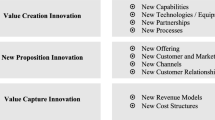Abstract
The UK launch of the Science Enterprise Challenge in 1999 has stimulated interest in the evolutions of science-based firms and this paper argues that Popper’s seminal diverse contributions to philosophy are directly relevant to them. It begins by commenting on the applications of both Kuhn’s and Popper’s concepts to technological (as against) scientific evolutions. It then suggests how Popper’s approaches are applicable to the development and assessment of new technology within the framework of Freeman’s stakeholders approach. Monsanto’s development of GMOs is used as an illustrative case.
Similar content being viewed by others
References
This is a revised version of a paper delivered at the conference Developing Philosophy of Management — Crossing Frontiers St Anne's College, Oxford 26–29 June 2002 organised by Reason in Practice: The Journal of Philosophy of Management in association with the Forum for European Philosophy.
MJC Martin ‘On Kuhn, Popper and Technical Innovation’ European Journal of Operational Research 14 no 3 November 1983 pp 221–227
Michael J C Martin Managing Innovation and Entrepreneurship in Technology-Based Firms New York, Wiley 1994 Chapter 2
Thomas Kuhn The Structure of Scientific Revolutions Chicago, University of Chicago Press 1970
Karl Popper Conjectures and Refutations New York, Harper and Row 5th Edition 1989
Joseph Schumpeter Capitalism, Socialism and Democracy New York, Harper and Row 1942
Richard R Nelson and Sidney G Winter ‘In Search of Useful Theory of Innovation’ Research Policy 6 (1977) pp 36–76
Giovanni Dosi ‘Technological Paradigms and Technological Trajectories’ Research Policy 11 no 3 June, 1982 pp 147–162
Giovanni Dosi Technical Change and Industrial Transformation London, Macmillan 1984
Giovanni Dosi et al (eds) Technical Change and Economic Theory London, Pinter 1988
Chris Freeman and Carlota Perez ‘Structural Crises of Adjustment: Business Cycles and Investment Behaviour’ in Giovanni Dosi et al op cit pp 38–66
David A Harper Entrepreneurship and the Market Process London, Routledge 1996 aau]12_Karl Popper ‘Evolutionary Epistemology’ in: David Miller (ed) Popper Selections pp 78–86 Princeton, Princeton University Press 1985
Harper op cit. p 167
Karl Popper ‘Piecemeal Social Engineering’ in: Miller op cit pp 304–318
Christopher Freeman The Economics of Industrial Innovation, 2nd Ed., MIT Press, Cambridge MA 1982
Alan Afuah Innovation Management Strategies, Implementation and Profits Oxford, Oxford, Oxford University Press 1998 p 385
Martin op cit 1994 Chapter 1
D J Teece ‘Profiting from Technological Innovation: Implications for Integration, Collaboration and Public Policy’ in: D T Teece (ed) The Competitive Challenge: Strategies for Industrial Innovation and Renewal Cambridge MA, Ballinger 1987
Michael J C Martin The Boots Company PLC: The Ibuprofen Project Cranfield, ICCH 395-126-1
R E Freeman Strategic Management: A Stakeholder Approach Boston, Pitman 1984
R Mitchell et al ‘Toward a theory of stakeholder identification and salience: Defining the principle of who and what really counts’ The Academy of Management Review 22 no 4 (1997) pp 853–886
Waddock et al 2000 argue that increased availability and access to information by stakeholders has made stakeholder analysis increasingly important.
Afuah op cit
Herbert Simon ‘A behavioral model of rational choice’ Quarterly Journal of Economics 69 no 1 1955 pp 99–118
R Nelson & S Winter An Evolutionary Theory of Economic Change Cambridge, MA Harvard UP 1982
J. Magretta ‘Growth through global sustainability: An interview with Monsanto's CEO, Robert B. Shapiro’ Harvard Business Review 75 no 1 1997 pp 78–88
G. Graham ‘Learning from the ‘Terminator’ debacle’ International Journal of Biotechnology 3 no 3/3 2001 pp 260–266
N Buckley ‘Labelling Agreed for Genetically Modified Seeds’ Financial Times April 3 1997 p 24
A Barrett ‘Rocky Ground for Monsanto? The new spin-off must sell investors on ag biotech’ Business Week, June 12 2000 pp 72–76
J. Champy ‘When to bow out gracefully’ Across the Board New York 37 no. 4 April 2000 p 7
Lucas P 2001 ‘Meet the kinder, gentler Monsanto’ The Journal of Business Strategy Vol 22 No 5 pp 26–27
W Leiss In the Chamber of Risks: Understanding Risk Controversies McGill-Queens University Press, Montreal 2002
www.royalsoc.ac.uk
www.gmnation.org.uk
www.defra.gov.uk
Author information
Authors and Affiliations
Rights and permissions
About this article
Cite this article
Hall, J.K., Martin, M.J.C. Developing and Assessing New Technology: Popper, Monsanto and GMOs. Philos. of Manag. 3, 13–22 (2003). https://doi.org/10.5840/pom20033219
Published:
Issue Date:
DOI: https://doi.org/10.5840/pom20033219




